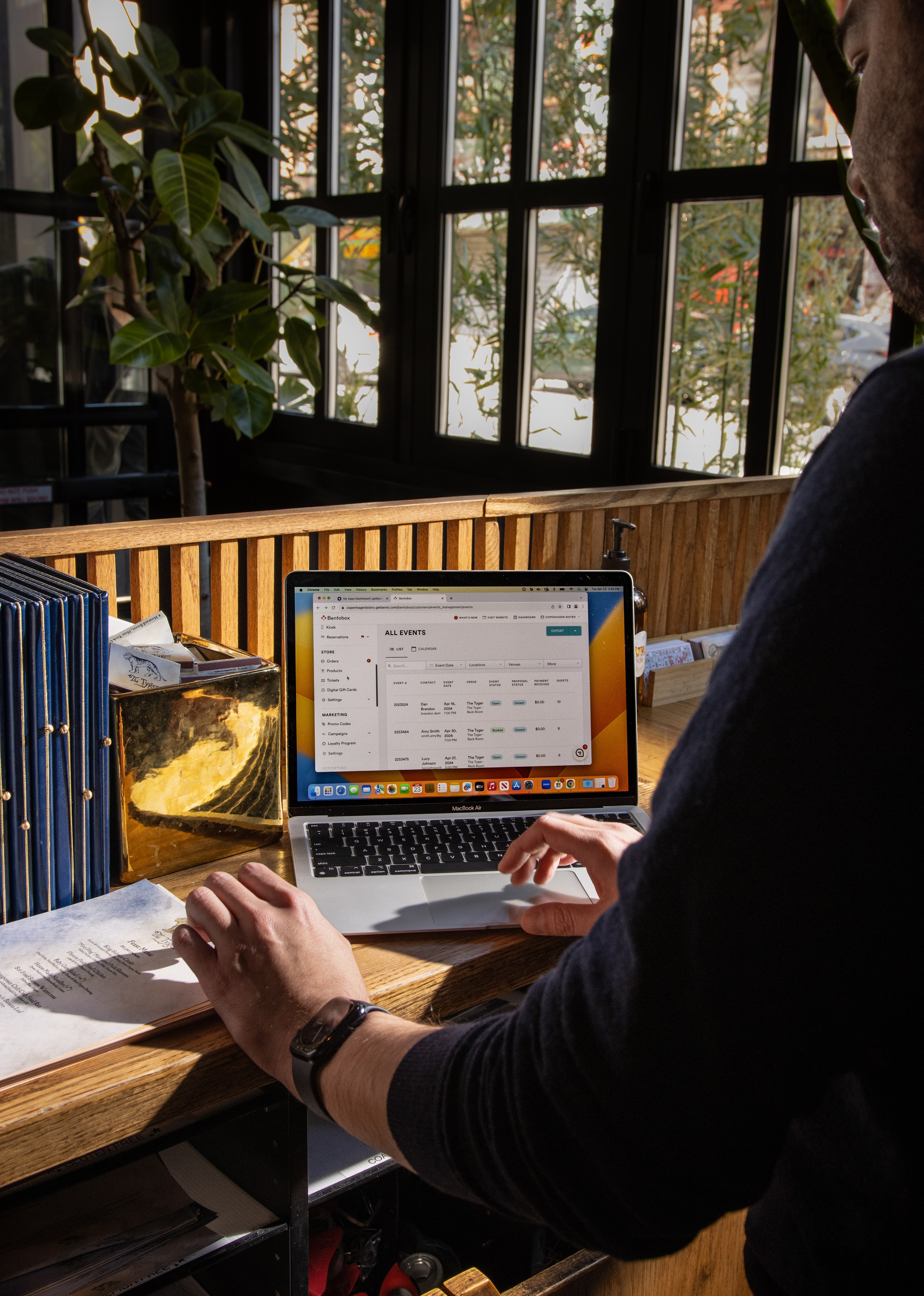Restaurant Forward
The Future of Virtual Cooking Experiences with Chef Hong Thaimee
June 30, 2022
The whirlwind force behind NYC’s Thaimee Love shares her secrets to a great online cooking class.
Restaurant Forward profiles the technology, trends and people changing the face of hospitality. Have a trend or industry expert you'd like to see featured? Send suggestions to RestaurantForward@getbento.com.
In the opening weeks of the COVID-19 pandemic, restaurants tried anything they could to stay open. Frustrated by supply chain hangups and the new constraints of delivery, many restaurants began posting cooking content on social media to communicate with their guests. Chefs would walk through recipes that viewers could try at home, teach knife skills and share updates from the restaurant as it navigated the crisis.
Overnight, virtual cooking content became a two-way lifeline, allowing diners to access their favorite restaurants and chefs to send their customers a thumbs-up from the trenches. Some chefs were so successful that they made video content a permanent fixture of their business.
To learn more about the present and future of virtual experiences, we sat down with Chef Hong Thaimee, owner of New York City’s Thaimee Love, who has parlayed a series of Thai concepts into a lifestyle brand featuring meal kits and cooking classes.
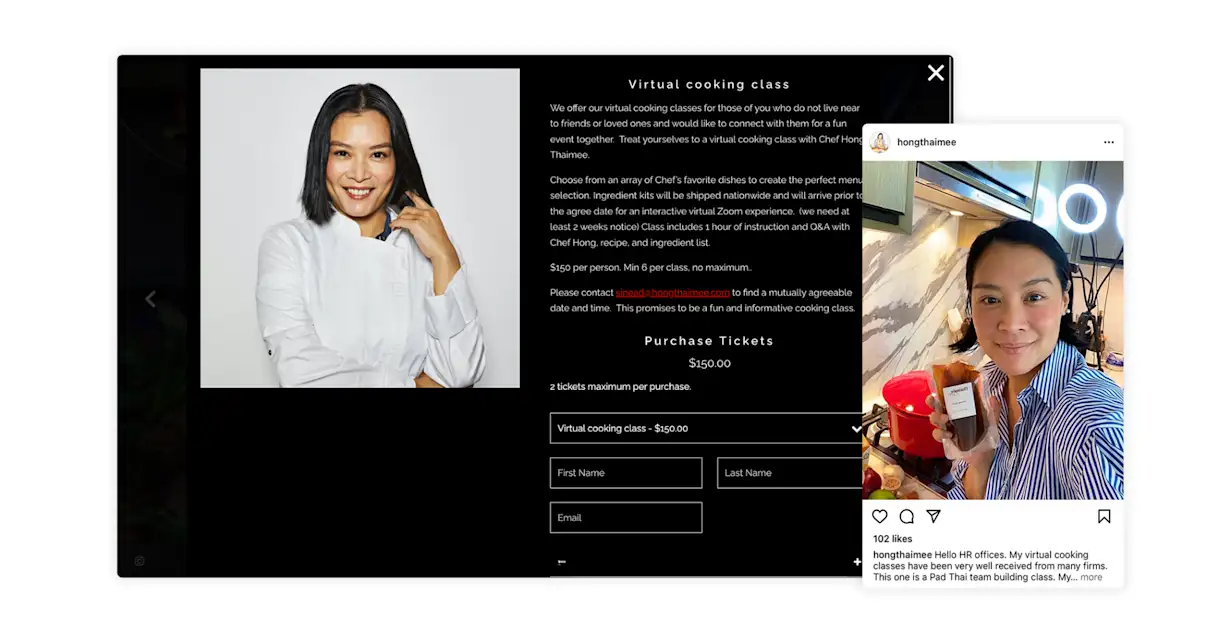
BentoBox: How did you start hosting virtual cooking classes? Was it a pandemic thing?
Thaimee: I’ve been hosting classes in-person for a while — once a month we close down our restaurant to host a session — but virtual classes started two years ago, yes. I was invited to do a fundraiser and ended up cooking for a lot of people. They asked me to teach an online-only cooking class. I said, “No, I will send you ingredients as well.” That formed the basis of what I do now. It’s become a good business for me. We also have a product line too, where we make a kit of food and send it out to students across North America.
When you send out ingredients ahead of time, how do you decide what to put in there?
We ship out a box that arrives two days before the class, and it’s full of any hard-to-find ingredients we’ll need, like makrut lime or kra pao, so no one has to make a trip to an Asian market. Some people find that pretty overwhelming. Anything that’s easy to find, like chicken breasts or trim, the students get themselves.
Was it daunting to start producing video from a technical perspective?
I think it took about five classes to settle on the way we do it now. I have an over-stove camera and one main camera so I can see and talk to my students. We’ve gotten a lot better at doing it. Setting up a class used to take an hour. Now we do it in 20 minutes.
What I didn’t think of at first was a moderator. If we have a bigger class — we’ve had fifty, seventy people before — I need someone who sees everything in the Zoom chat and can get my attention. “Hey, Chef, we have a question here.” My partner Conor has TV presenting experience and does that very well. We had a class recently with about 40 people. He did a great job entertaining them: “Don’t worry, I’m a white guy and I didn’t know how to eat spicy food until last year, so here’s how to eat chili.” They loved it!
So you’re creating hospitality over Zoom by kind of recreating a restaurant setup: front-of-house attending to guests while the chef does the show.
You need to entertain them. The clientele for cooking classes are groups that want to do team-building, say thank-you to clients, whatever. So they buy a ticket and we entertain them.
I look at it as if I were the one in a class. What do I want from my instructor? Someone who can keep me attentive, right? Someone who can give me information about the foods I'm cooking, so I can learn more. Someone who's approachable but maybe dressed up nicely for the event as well. So it’s not just running a class; it’s making it into a whole experience.
What’s the difference between what you provide in a restaurant versus virtually?
When I'm in the kitchen, my goal is to be the leader in the kitchen. Make sure every plate goes out well. When I'm in my dining room, I switch into the owner of the restaurant. I talk to my staff and my customers. It’s a different kind of showmanship from Zoom. It’s one-on-one. “Hey, Chef, do you remember me?” Or they’ll say they saw me on TV or something, so I say, “OK, let’s do a selfie!” That’s what they want from you. It’s part of the job.
In both places you have to connect with people: repeat their names, ask about them, recognize them. Everyone wants to be recognized. You’re also telling stories about the food in both situations: “We commissioned this trout from a farm upstate,” or “Here’s the story of when I learned to cook this at home.” But the online class is like you’re onstage. You have to control the crowd.
What kind of cooking happens in your class?
We script the first five minutes as an introduction. Then I say, “Okay everyone, before you cook, we need some mise en place. But while we’re talking about that, let’s start heating up the pan together.” This is a whole technique that they probably don’t have yet, so I have to guide them through every step. You can’t assume that people know how to heat the oil or that they’ll know the word “caramelize.”
Or people will always tell me, “Chef, I don’t have a wok.” Forget about your wok! People think, Oh, I’m cooking Asian food, I need a wok. A wok is supposed to be used with, like, a 50,000 BTU gas pit. A cast-iron pan is easier to get hot on your stove. You wouldn’t buy a Ferrari just to drive around Manhattan, would you?
I don’t think virtual cooking classes are designed for you to be an expert overnight. It’s designed for you to get some entertainment and have an experience close to a real cooking class. And that’s the responsibility of the instructor: to guide them through every step.
What advice would you have for another chef thinking of launching a virtual franchise?
I think of virtual class as “edutainment.” You want to make it fun and full of useful information. Use your charm and be yourself. You are the teacher in that situation, not just a chef, so make sure your students learn something from the enrollment.
It’s like anything else: all you can do is try it and learn. But plan well. And keep in mind that your primary job is going to be entertaining. It’s like the third hat you wear: chef when you’re in the kitchen, owner when you’re in the dining room, and teacher when you’re in front of a crowd.
Looking ahead, a number of companies are trying to launch platforms for hosting digital cooking experiences. What’s your prediction for the future of this space?
What else would technology do? You can’t transport the smell, right? My feeling is, it would take a longer time for the technology to develop than it will take for customer behavior to change, one way or the other.
A lot of people are hopeful this continues to grow, but people still want that face-to-face connection. Video classes are great if you’re an entertainer or you want to widen your customer base, but at the end of the day, I think people want the taste and touch and experience of a restaurant. That’s where the real fun happens.
To see Chef Hong Thaimee’s selection of cooking classes, visit HongThaimee.com.

BentoBox Marketing & Commerce Platform
Deliver Smarter Hospitality
Want to stand out online, bring in more money, engage your diners, and streamline operations?
Recommended
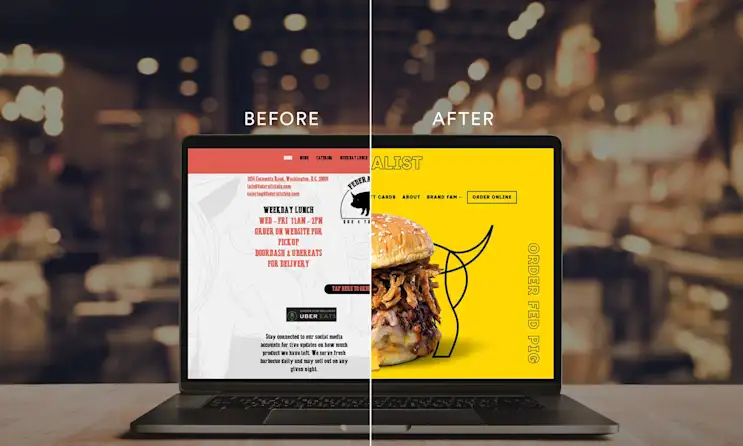
Design Inspiration
Before & After: Restaurant Website Redesigns
January 25, 2022
A sample of last year’s most impressive restaurant website launches — before and after BentoBox.
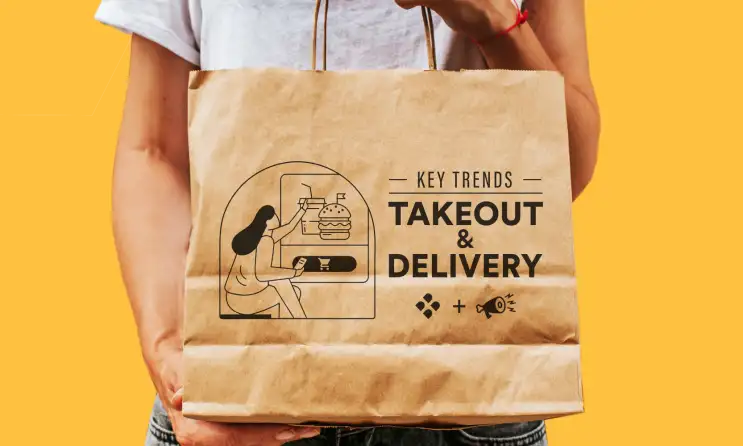
Commerce
Diner Survey: Direct Online Ordering Will Grow in 2022
February 9, 2022
Vaccine requirements, delivery app fatigue and a desire to help restaurants have created a perfect storm for direct online ordering.
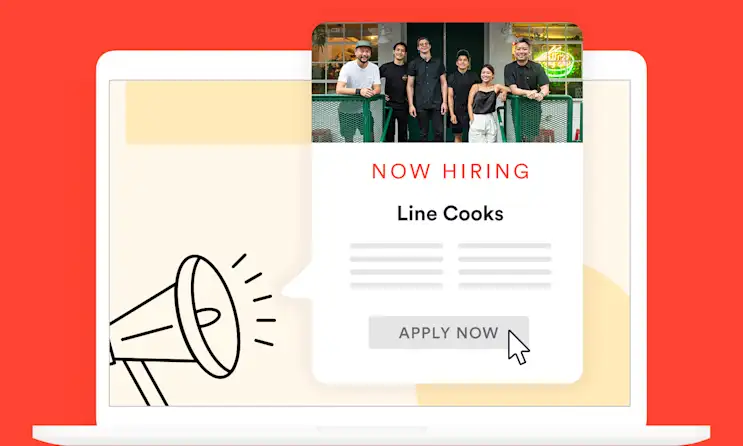
Staffing
Why Restaurants Must Evolve as Employers
September 16, 2021
Enhanced unemployment benefits were not the only reason for the labor shortage. As worker priorities change, the restaurant workplace needs to change with them.
